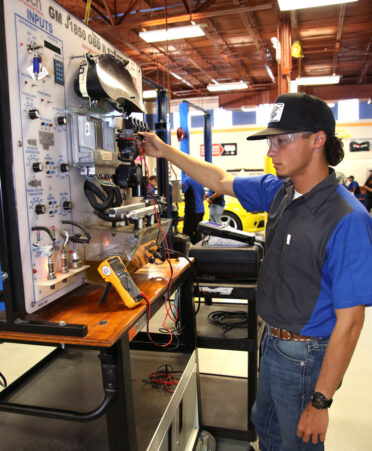(HARLINGEN, Texas) – Nathan Weaver recalls the moment when his father, a military veteran, first introduced him to repairing the family’s automobiles during his junior year of high school.
The clatter of tools and the revving of a restored automobile engine would inspire Weaver to pursue a certificate of completion in Automotive Maintenance and Light Repair at Texas State Technical College’s Harlingen campus.
“There was a time when me and my father worked on the automobile engine of a 2002 Ford Mustang,” the Harlingen resident said. “It was just a great experience learning from him. When I transitioned to my senior year in high school, I knew I wanted to become a mechanic.”
Automotive Maintenance and Light Repair is one of TSTC’s performance-based education, or PBE, programs. In PBE, students work with coaches to develop schedules in two-hour time blocks. Lectures, videos and other learning content is on Canvas, a learning management system. Instructors also do mini-lectures throughout the day as needed. Tests can be written, demonstration-based or online. Some students with professional experience can test out of some lessons.
Weaver said the PBE format fits him perfectly.
“I enjoy PBE because it shows me what I will learn before I start in the classroom and lab,” he said. “After we complete our PBE module, our instructors will ask us questions based on what we learned on Canvas. I’m doing great at it, thanks to advice from my father, which is, ‘I’m late if I’m 15 minutes early, but I’m on time if I’m 30 minutes early.’ He instilled his military knowledge in us from an early age.”
Perla Limas, a TSTC PBE mentor, said Weaver has demonstrated a strong dedication to his studies.
“Nathan has done well by completing the online portion of his education, which may sometimes be a barrier for other students,” Limas said. “His commitment to online learning often leads to him seeking additional resources.”
Weaver appreciates his instructors’ in-depth expertise.
“Thanks to their knowledge, I will be accomplished and confident when I have to service a customer’s automobile,” he said. “They teach us what to do and how to do every procedure. For example, to take off a specific part of a vehicle, we have to do a certain number of procedures beforehand to ensure everything is good. It’s been a great learning experience.”
Leo Tamez, a TSTC Automotive Technology instructor, said Weaver is willing to take on any challenge that he is given.
“Nathan is the first student to accept an assignment,” Tamez said. “He is a motivated student and should have no problem finding a job in a shop of his preference.”
Weaver has set his career sights on automobile racing, but not behind a steering wheel.
“My dream job is to be a high-tech drag racing mechanic,” he said. “I want to work on high-tech dragsters and high-horsepower automobiles. I would like to be one of the best mechanics in the industry.”
The need for qualified automotive service technicians and mechanics is expected to grow in Texas over the next several years. According to onetonline.org, Texas employs more than 55,000 of these technicians around the state, and that number was forecast to top 61,000 by 2030. The average annual salary for a technician in the state is $44,810.
In Automotive Technology, TSTC offers an Associate of Applied Science degree and several certificates of completion at the Harlingen, Sweetwater and Waco campuses.
For more information about TSTC, visit tstc.edu.
